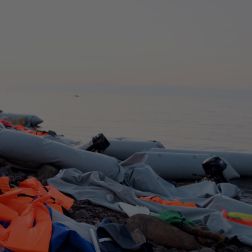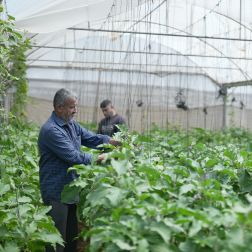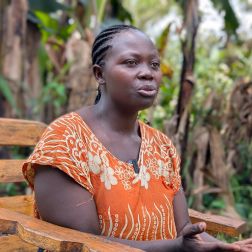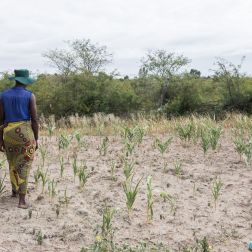- 6 mins read time
- Published: 5th May 2020
Life under lockdown - How Syrian refugees are protecting each other against Covid-19
"Some people thought flies could carry and transmit Covid-19 or that garlic, herbs and licorice-root tea could cure you of it… Others asked whether it was just the elderly who were at risk, there were so many rumours circulating a few weeks ago that it was hard to tell what was true and what wasn’t.”— Aysha, a Syrian refugee at Za’atari Refugee Camp.
As Covid-19 continues its relentless spread, refugees at Za’atari camp in Jordan are petrified at the thought of it hitting their community.

Hundreds of thousands of Syrian refugees like Aysha embarked on harrowing and dangerous journeys in search of safety. Almost ten years later, the Za’atari Refugee Camp remains home to tens of thousands of people.
As the global Covid-19 pandemic continues its indiscriminate spread, proving no country or community is immune, researchers and experts continue to sound alarm bells about the devastation that could be unleashed if the virus spreads in refugee camps - places simply not built to weather a crisis of this nature.
Over the last few weeks, in an effort to protect against Covid-19, Oxfam’s programming adjusted - in an effort to ensure refugees are equipped as best as possible, Oxfam immediately kick-started online and offline hygiene awareness campaigns, community information sessions and a sophisticated phone tree network to disseminate messages and updates to as many people as possible.
“We’ve created a number of different chat groups on various platforms to spread awareness on the virus,” Aysha says.
“We stop rumours in their tracks, answer questions, listen to concerns and steer people in the right direction about everything from hand washing and hygiene to physical distancing. We also make sure that people only share material from reliable and valid sources.”
Aysha is one of hundreds of paid volunteers who are part of Oxfam’s Cash for Work programme designed to give refugees work opportunities, training, and a source of income.
The programme recognises and builds on existing skill-sets in a number of different areas that range from environmental caretakers and cleaners, community outreach workers, recycling workers and technical engineers. It was set up to fill a long-standing gap that made it difficult for refugees in the country – especially women – to access permits to work outside the camps.
As one of 18 community engagement workers trained to mobilise, engage and raise awareness throughout the Za’atari community, Aysha’s job these days is more important than ever.

“We anticipated it eventually hitting here even though the virus still felt like it was far away, it seemed like only a matter of time", says Mohannad Abu Siam, Oxfam’s Senior Community Engagement Officer.
“We knew we needed an outreach strategy that could reach the most people in the least amount of time and we got to work immediately,” he says.
“We were on our phones, coordinating meetings, scribbling on white boards, organising phone trees, running community information seminars – including a partnership with UNICEF to run hygiene awareness sessions at schools and youth centres throughout the camp.”
Today, over 400 volunteers are part of a sophisticated messaging network that’s estimated to reach tens of thousands of refugees every day, cascading key updates, fielding questions and methodically tracking information that helps inform outreach material.

The nationwide curfew measures that have transformed the entire country have also changed life at Za’atari.
“Given how widespread the misinformation was about Covid-19, it’s rewarding to know I’m helping our community. The message to stay home was hard at first but given what the camp looks like these days, I think we got through,” Aysha says.
What was once a bustling five-square-kilometre refugee camp full of lively markets and street vendors, selling everything from wedding dresses to local cheese has since been transformed to a labyrinth of deserted streets, closed-up store fronts and an unfamiliar quiet has flooded the camp - no longer are the streets full of young and old making the best of unfortunate circumstances.
While she sits in her small caravan responding to community messages coming into her phone, Aysha’s two young children are glued to online classes.
“Students are now learning from home, meaning we get an additional ten hours of electricity during the day and then another two in the evening.”
Aysha describes the challenges of adjusting to these unprecedented times. Her frustration never articulated, but discernible in her voice.
“I lost my husband to the war. I’m the one that takes care of the kids, our home and the one that works. The most important thing to me is my kid’s education. So, I’m doing my best. I’m trying to help them with their homework, but this remote-learning system simply isn’t the same”, she says.
Despite it, she deliberately makes a point to express her gratitude.
“My work means everything to me, it’s not just a livelihood opportunity or just a job, it has given me a sense of purpose, ownership and agency. It’s so gratifying to be able to help raise awareness and connect with the community in these times of need.”
When asked how she feels about the future given the pandemic and the new normal that has become life under curfew, Aysha hangs onto a similar optimism.
“I think it’ll pass. It’ll pass, and we’ll soon be back to our normal lives where Za’atari’s streets will be buzzing once again the way they used to be. For now, I’m just glad that everyone is taking it seriously. I’m glad they’re following the curfew rules and staying home. And I’m so glad to help be a part of helping spread that message.
Ultimately, its precisely that that’s going to get us through this.”
Words by: Eiman Zarrug (based on an interview conducted by Aisha Shtiwi)
**This initiative would not be possible without the generous support and funding from the European Union (EU), the German Federal Ministry for Economic Cooperation and Development (BMZ) and UNICEF.
**Contents of this piece are the sole responsibility of Oxfam and don't necessarily represent views of the donors.

This disease knows no borders and does not discriminate. For the world’s poorest and most vulnerable, the worst is yet to come as the coronavirus begins to establish itself and spread quickly through communities powerless to stop it, without access to water, sanitation or healthcare.
Together, we can save lives.




